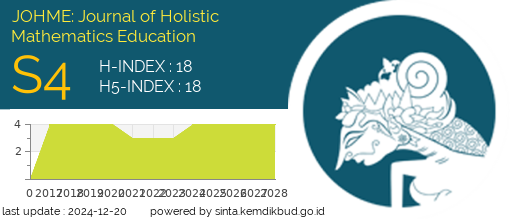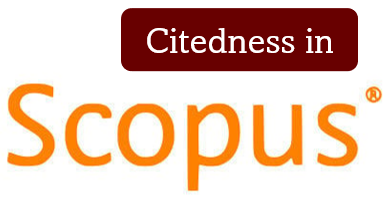HUBUNGAN ANTARA KECERDASAN SPIRITUAL (SI) DENGAN HASIL BELAJAR KOGNITIF SISWA KELAS VIII SMPK KALAM KUDUS YOGYAKARTA PADA PEMBELAJARAN MATEMATIKA [THE RELATIONSHIP BETWEEN SPIRITUAL INTELLIGENCE (SI) AND COGNITIVE LEARNING OUTCOMES OF GRADE 8 STUDENTS SMPK KALAM KUDUS YOGYAKARTA IN LEARNING MATHEMATICS]
DOI:
https://doi.org/10.19166/johme.v2i1.1021Keywords:
spiritual intelligence, cognitive learning outcome, Kecerdasan spiritual (SI), hasil belajar kognitifAbstract
Spiritual intelligence is intelligence that motivates human beings to discover the meaning and purpose of life and encourages growth in creativity, morals and character. One factor that affects learning outcomes is spiritual intelligence. This research aims to see the correlation between spiritual intelligence (SI) and students’ cognitive learning outcomes. The research method used was a quantitative causal correlational with a saturated sampling technique (sample member is the same as population member). The data was collected by using a questionnaire to measure students’ spiritual intelligence and a test to measure students’ cognitive learning outcomes. Product Moment Correlation was used to test the instrument’s validity while Alpha Cronbach and Guttman Split Half was used to test the instrument’s reliability. Rank Spearman was used to calculate the coefficient correlation. All the data was analyzed using SPSS 20. The research showed that there is positive correlation between students’ spiritual intelligence and their cognitive learning outcomes (r = 0.2317).
BAHASA INDONESIA ABSTRACT: Kecerdasan spiritual (SI) merupakan kecerdasan yang mendorong manusia menemukan makna dan tujuan hidup serta mendorong bertumbuh dalam kreativitas, moral, maupun karakter. Salah satu faktor yang mempengaruhi hasil belajar adalah kecerdasan spiritual. Tujuan penelitian ini adalah untuk melihat hubungan antara kecerdasan spiritual dengan hasil belajar kognitif siswa pada pembelajaran Matematika. Metode penelitian yang digunakan adalah metode kuantitatif kausal korelasional.Teknik sampling yang digunakan adalah sampling jenuh, yaitu seluruh populasi dijadikan sampel penelitian. Metode pengumpulan data menggunakan angket untuk mengukur variabel kecerdasan spiritual dan tes untuk mengukur variabel hasil belajar kognitif siswa. Uji validitas instrumen menggunakan korelasi product moment dan reliabilitas instrumen menggunakan alpha cronbach’s serta guttman split half. Uji koefisien korelasi menggunakan rumus rank spearman dan menggunakan SPSS 20 untuk menganalisis data. Hasil penelitian menunjukkan bahwa terdapat hubungan positif antara kecerdasan spiritual dengan hasil belajar kognitif siswa (r = 0.2317)
References
Amram, J. Y. (2009). The contribution of emotional and spiritual intelligences to effective business leadership (Doctoral dissertation). Institute of Transpersonal Psychology, Palo Alto, California. Retrieved from http://www.yosiamram.net/docs/EI_and_SI_in_Leadership_Amram_Dissert.pdf
Arifin, Z. (2009). Evaluasi pembelajaran. Bandung, Indonesia: Remaja Rosdakarya.
Basuki, K. H. (2015). Pengaruh kecerdasan spiritual dan motivasi belajar terhadap prestasi belajar matematika. Jurnal Formatif, 5(2), 120-133. Retrieved from http://journal.lppmunindra.ac.id/index.php/Formatif/article/view/332
Buzan, T. (2001). The power of spiritual intelligence: 10 ways to tap into your spiritual genius. London, UK: Thorsons.
Djamarah, S. B., & Zain, A. (2014). Strategi belajar mengajar. Jakarta, Indonesia: Rineka Cipta.
Esmaili, M., Zareh, H., & Golverdi, M. (2014). Spiritual intelligence: Aspects, components and guidelines to promote it. International Journal of Management, Accounting and Economics, 1(2), 2383-2126. Retrieved from http://citeseerx.ist.psu.edu/viewdoc/download?doi=10.1.1.678.647&rep=rep1&type=pdf
Habsari, S. (2005). Bimbingan dan konseling SMA. Jakarta, Indonesia: Grasindo.
Khodijah, N. K. (2014). Psikologi pendidikan. Jakarta, Indonesia: RajaGrafindo Persada.
Knight, G. R. (2009). Filsafat & pendidikan: Sebuah pendahuluan dari perspektif Kristen. Jakarta, Indonesia: Universitas Pelita Harapan Press.
Kristiana, T.G., Winardi, Y. & Hidayat, D. (2017). Biblical integration in a mathematics classroom: Qualitative research in a senior high school. JOHME: Journal of Holistic Mathematics Education, 1(1), 1-9. DOI: http://dx.doi.org/10.19166/johme.v1i1.709
Nurdiansyah, E. (2016). Pengaruh kecerdasan spiritual, kecerdasan emosional, dampak negatif jejaring sosial dan kemampuan berpikir divergen terhadap hasil belajar matematika siswa. Journal of EST, 2(3), 171-184. DOI: https://dx.doi.org/10.26858/est.v2i3.3216
Priyatno, D. (2012). Belajar cepat olah data statistik dengan SPSS. Yogyakarta, Indonesia: Andi Offset.
Rampisela, D. I., Rompas, S., & Malara, Reginus. (2017). Hubungan kecerdasan emosional dan kecerdasan spiritual dengan prestasi belajar siswa di SMP Katolik St. Fransiskus Pineleng. e-Jurnal Keperawatan, 5(1), 1-6. Retrieved from https://ejournal.unsrat.ac.id/index.php/jkp/article/view/14895/14459
Singh, M., & Sinha, J. (2013). Impact of spiritual intelligence on quality of life. International Journal of Scientific and Research Publications, 3(5), 2250-3153. Retrieved from http://www.ijsrp.org/research-paper-0513/ijsrp-p1705.pdf
Siregar, E., & Nara, H. (2010). Teori belajar dan pembelajaran. Bogor, Indonesia: Ghalia Indonesia.
Sisk, D. A., & Torrance , P. (2001). Spiritual intelligence: Developing higher counsciousness. New York, NY: Creative Education Foundation Press.
Slameto. (2010). Belajar dan faktor-faktor yang mempengaruhinya. Jakarta, Indonesia: Rhineka Cipta.
Soentoro, A. I. (2015). Cara mudah belajar metodologi penelitian dan aplikasi statistik. Depok, Indonesia: Tramedia Bakti Persada.
Sudjana, N. (2014). Penilaian hasil proses belajar mengajar. Bandung, Indonesia: Remaja Rosdakarya.
Sugiyono. (2011). Metode penelitian kuantitatif kualitatif dan R & D. Bandung, Indonesia: Alfabeta.
Van Brummelen, H. (2006). Berjalan dengan Tuhan di dalam kelas: Pendekatan kristiani untuk pembelajaran. Jakarta, Indonesia: Universitas Pelita Harapan Press.
Vaughan, F. (2002). What is spiritual intelligence? Journal of Humanistic Psychology, 42(2), 16-33. DOI: https://doi.org/10.1177/0022167802422003
Zohar, D., & Marshal, I. (2005). Spiritual capital: Memberdayakan SQ di dunia bisnis. Bandung, Indonesia: Mizan.
Zohar, D., & Marshall, I. (2007). SQ: Kecerdasan spiritual. Bandung, Indonesia: Mizan Pustaka.
Downloads
Published
How to Cite
Issue
Section
License
Authors who publish with this journal agree to the following terms:
1) Authors retain copyright and grant the journal right of first publication with the work simultaneously licensed under a Creative Commons Attribution License (CC-BY-SA 4.0) that allows others to share the work with an acknowledgement of the work's authorship and initial publication in this journal.
2) Authors are able to enter into separate, additional contractual arrangements for the non-exclusive distribution of the journal's published version of the work (e.g., post it to an institutional repository or publish it in a book), with an acknowledgement of its initial publication in this journal.
3) Authors are permitted and encouraged to post their work online (e.g., in institutional repositories or on their website). The final published PDF should be used and bibliographic details that credit the publication in this journal should be included.”










